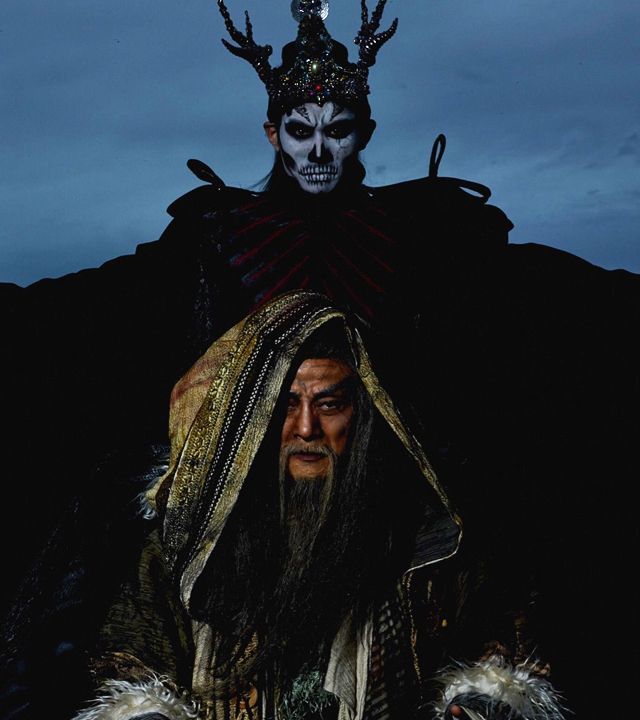"Beauty... Please Do Not Cease..."
Artistic Director, Director, and Lead Performer: Wu Xingguo
Rooted in Tradition, Leading to the New Era
Goethe's Faust differs greatly from Marlowe's version, which is filled with magic and comedic effects. Goethe’s work, on the other hand, is a lyrical and contemplative epic, where profound reflections on life’s grand adventure are intertwined with Greek mythology and Shakespearean-style tragedies, exploring the conflicts between human nature and society. It also delves into the vast cosmos, leaving the traveler adrift in the boundless world, lost in music, dreams, beauty and ugliness, good and evil, ultimately questioning the meaning of existence.
Five Tragic Experiences
In the monumental 12,111 lines of poetry, the key dramatic structure for the Contemporary Legend version of Faust can be divided into five main tragedies, as many scholars have outlined:
- Knowledge – Rejecting faith and morality, seeking to experience life by any means necessary.
- Love – The ideals of free love are suppressed by societal pressures and the sorrow of women.
- Politics – A satire of deceit, falsehood, and the incompetence of governments, as well as the manipulation of the masses.
- The Search for Beauty – The worship of civilization, mythology, and the illusion of pursuing the ultimate beauty of the spirit.
- Ideals – The desire to do good and practice benevolence, only to commit sins in the process, leading to lifelong regret.
Goethe began writing Faust at the age of 24 and completed it only at the end of his life, after 60 years. The wisdom, knowledge, and experiences accumulated over his life are rich and diverse, making it impossible to fully present in just 150 minutes. The first part of the play, featuring Faust’s tragic love affair with the devil, where he transforms into a youth and falls for the innocent Gretchen, is dramatic enough to rival Shakespeare’s works and is easier to present. Some Western directors may modernize Gretchen’s character, placing her in a subway scene, for instance. However, I have chosen to portray her pure love through classical and delicate romanticism, which resonates with Faust’s transformation into a handsome young man and his longing for love. This choice relates to the techniques of traditional Chinese opera and its stylized vocal performance.
In the first half, from the prologue to Gretchen’s death, there are 28 scenes, but I have focused on six: the study, the street, the young girl’s bedroom, the duel, the mountains, and the prison. The second half is split into five acts and 26 scenes, which are incredibly rich and expansive, dealing with themes of nation, society, faith, family, and the development of Western civilization and democracy over the past two thousand years, since the time of ancient Greece. To fully grasp and present this content would require another three hours. Given the cultural context and my own life experience, I chose to focus equally on the themes of women (Helen) and politics (the ideal state), agreeing with playwright Lin Xiuwu’s perspective of examining politics and war through a mother’s lens, focusing on the harm caused to nature and the next generation.
Thus, the second half’s main focus is on eight scenes: the mysterious realm, the imperial palace, the Shanglin Garden, the Classic of Mountains and Seas, Helen and Faust, Shanglin Garden again, the ideal state, and the study.
Overall, the goal of this production is to explore the beauty of Goethe’s original epic through the lens of our own performing arts aesthetics.
A Dream of a Lifetime, A Fleeting Moment
~ What we have is out of reach; what has passed is forever real ~
The final line of Faust—“Beauty, please stay!”—speaks of time as the ultimate ruler. All beautiful things, people, and events are eventually swallowed by time, returning to the void. Humanity can only live in the present, grasping the moment and truly experiencing life.
Goethe said: “Art is long, life is short.” In Faust, there is a line: "It is precisely because it is impossible that it is worth our belief!" But do we truly believe that beauty is eternal? Or, as Chinese scholars say, does a lifetime of labor only end in the pursuit of perfection? Where does the happiness of life truly lie? Must we continue to chase this dream of ideals?
Love, Promising Heaven and Earth, Life Invested on Stage
This is my most authentic feeling as I face myself. Regardless of the outcome, I have tried my best to bring my love for Kunqu opera and Peking opera to life on an Eastern stage designed by architect Liu Peisen. With costumes inspired by the elegance and grandeur of the Sui and Tang dynasties by Kang Yanling, we approach the joy and fear of over seventy characters. The Nuo masks created by Zhang Wang, intertwined with the images of Wang Yisheng’s projections, blur the boundaries between the human and puppet worlds. The young composer Wang Yiyu, together with Wuhan’s top vocalist Li Lianbi, helped me complete the xingge style music and singing. Through the light and shadow created by Huang Zuoyan’s day-night spectrum, we navigate a world where humans, gods, witches, and demons all exist together.
I am deeply grateful to all the performers, musicians, and behind-the-scenes collaborators. We have dedicated ourselves to this literary journey, which is a magnificent, romantic, and grand adventure! I hope this journey will continue to move forward, ever onward, never ceasing...

